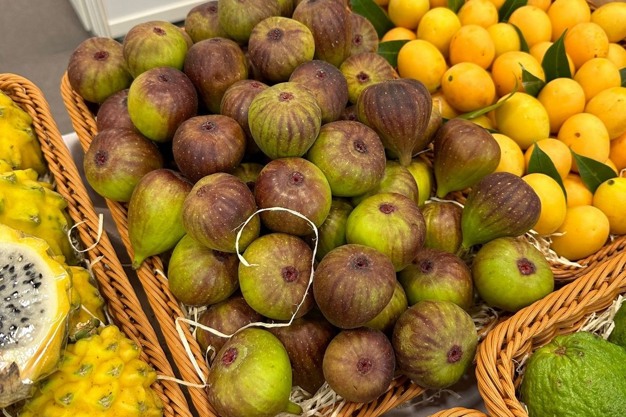Figs from Brazil continue to interest high-end shoppers in Europe says Rafael Fabiano, from Campal Frutas in Brazil. "Fig exports from Brazil are now heading for the last half of the season with prices that are around the middle-level of €4 to €4.50, which is a good price for both selling and buying of this product."
The exporter grows for the local market and exports 650 tons of figs. Besides the figs they also export exotic fruit to world markets from their base in São Paulo, Brazil. "Like any other product we have challenges with prices. There is always this fight that the producer wants more and the importer wants to pay less. In the pandemic we had a huge jump in prices, it was insanely high, which was good for producers, but the costs increased a lot too. Now in the market we have had a very good price, this shows we managed to do a good job. The prices of figs changes depending on the time of the year. At the beginning of the season we reach €8.50 to €9, which normalises at around €4 - €4.50. Sometimes during the year we have to decrease our prices, that's not ideal for us. We always look to do something around the middle mark, it all depends on the demand, if it is high, or when the offer is lower. When Brazil's fig season starts everyone wants figs," explains Fabiano.
He says they halt exports of figs from Brazil for a short period when Turkey is in full production. "The peak season for Brazil is November to July, with the peak season of Turkey starting from August to September, while sometimes stretching a little bit into October. When the EU season of figs starts, they basically stop all the export from Brazil. They produce a very big amount, but have a short season. In Brazil we managed to break the seasonality, we have figs all year round. We have other markets when the EU season is at its peak. Canada and other markets don't stop buying from Brazil because of the European season when it is much cheaper to buy from local suppliers than other importers," states Fabiano.

He says they are developing a good presence in the Middle Eastern markets. "We manage to reach different sales locations in the Middle Eastern region, the main factor for this is due to the cultural heritage, where they are familiar with consuming figs as an ancient fruit that is even mentioned in the Bible."
Not worried about competing countries
Their competitors are Argentina and Peru, with the latter as one of their main competitors. "This year, the good thing is even if we do have a divided season, we can manage to have supplies, when it's our peak it's not the Peru or EU peak season. Argentina sometimes starts at the end of November. We are currently in the middle of our season. They are not very high in production. We manage to have a good season even with those competitors on the market. Brazilian figs are very much appreciated by the importers, we don't have a big problem with the competition."
In Brazil their most popular fig varieties are the Brown Turkey variety also called the Valinhos' Purple Fig. "In Peru and Argentina, as well as Turkey, they have the Black Mission figs. In Europe they do have the tradition of consuming figs. which are a much appreciated product in the higher priced market. It is an expensive exotic product."
He concludes by saying Campal Frutas also exports 10 other products besides figs. "We export other exotics too, such as avocados, atemoyas, guava among others. We are starting with mango, ginger, and limes from. We work with smaller growers, help them to develop and sell in the local market while we use our own production to sell in the export markets. Today 80-90% of our production is already certified."
For more information:
Rafael Fabiano
Campal Frutas
Tel: +55 19 99698-4108
Email: rafael@campalfrutas.com.br / export@campalfrutas.com.br
www.campalfrutas.com
